IJCRR - 7(22), November, 2015
Pages: 57-61
Date of Publication: 21-Nov-2015
Print Article
Download XML Download PDF
MANAGEMENT PRACTICES, EMPLOYEE TRAINING AND ITS IMPACT ON WORKING OF ORGANIZATIONS IN JAIPUR RAJASTHAN
Author: Sandesh Kumar Sharma, Cheidam Kumar Sharma, Kiran Sharma
Category: Healthcare
Abstract:Aim: To find out employees' view at work place their carrier growth and management practice. Methodology: Sample size is 50 to carry out research. Sampling method is random sampling. The work was done on Microsoft word and graphical charts etc. are prepared for better understanding. Results: The data collection is done through survey method. The Questionnaire were given to the employees based on their feedback, the surveys measure the internal environment, or in general how people view their work, and the workplace. The types of issues covered in an environment survey are; work satisfaction, rewards and recognition from organization. Management practices its leadership and opportunities given by employer to employee, the positive impact of employee training increases the productivity and growth new policies has significant effect on Productivity growth. Conclusion: This study examined to show the effectiveness of management practice and how the organization environment affects the behavior of the employees. The study is carried out by taking feedback from employees who have gone through the training programme. It is clear in the study that the training programme in the organization is good but yet step can be taken in order to make the training programme much more effective and to get a positive output from the employees. The study also shows that performance of employees depends upon the training they received for the job and at the same time on job behavior of the employees is also affected by the training programme, i.e. if the employees is trained well about his job, he/she is confident about his/her work will that reflect in the performance of the employees..
Keywords: Management practice, Job satisfaction, Training, Team work, Employee participation
Full Text:
INTRODUCTION
It is very difficult to justify the training of employee in Organization; there are times when organization has to give good reason for expenditure on training and rewards for employees at the same time the organization also face financial difficulties to continue these Program, the objective of organization is to improve the performance of employee and also to identify the key areas which are hindering production, reducing effectiveness and which might generate unexpected costs. The idea behind this not to simply perform an academic exercise (training) every year, but to generate higher level of performance for the Organization, once opportunities are identified to reinforce approaches and also select appropriate interference for addressing the weak areas, which should be aggressively pursued for the maximum benefit of everyone. Management has to include facilities like health, safety and waste management. The organization has to arrange programmes on health issues such as free medical Check-up, other than this the organization also has to arrange programmes on safety related topics with the help of trainers in the field. The organization continues to focus on maintenance and performance improvement of related pollution control facilities like treatment plant and waste disposal facility at its manufacturing locations. Enterprise has to ensured eco-friendly disposal of waste at the designated disposal site in addition; the organization has complied with the environmental norms. Organization’s value proposition is based on customers, through innovation and by consistently improving efficiency. With a view to create there source bandwidth for the future organization initiated various measures such as investing in new skills, technologies, business models and training programmes for key technology areas. Growth in the organization extends beyond just numbers and includes personal growth for each individual of the organization. Organization continued its focus in creating an aesthetic, environmentfriendly industrial habitat in its factory units, mobilizing support and generating interest among staffing and labor for maintaining hygienic and green surroundings. Good human resource management plays a key role in company performance. The employee relations during the year have remained cordial and satisfactory. Attracting and retaining dedicated and skilled human resource, off erring them a conducive work environment and excellent career development opportunities are currently prime HR priorities.
MATERIALS AND METHODS:
For this study Descriptive research design has been adopted.
Objective of Study
• Analysis of how employee view their work and work place
• To study of management practices
• To study how to maintain co-operation in company
• To know the carrier growth and opportunity in company for employee Data Collection:
• Primary data is collected through survey.
• Secondary data is collected from internet, annual report of the company, magazine, and newspaper.
Types of Questions for This Project: - Open ended questions are used in this project.
Sampling plan:
The selection of respondents were accordingly to be in a right place at a right time and so the sampling were quite easy to measure, evaluate and co-operative. The sampling method that attempts to obtain is Random Sampling. Sample size It is the basic unit of the population to be sampled herePlan analysis To minimize manual work of calculation, the work was done on Microsoft word and graphical charts etc. are prepared for better understanding.
Limitation of the Study:
• The study was conducted and confined to the Jaipur region only.
• Limited time period and sample size due to monitory restriction is another limitation of study
• There was always a hidden fear of management to the employee that was depriving employee of giving the correct responses.
• Sincere efforts is made to remove this fear but still it is difficult to read a human mind and the thoughts regarding the questions asked is another limitation.
RESULTS
From the Environmental Survey it was observed that the employee agrees with the statement that training facilities will improve the performance of organization in today’s competitive world. Co-operation with co-workers and subordinates is very necessary to work in an organization and it was seen that in most of the organizations subordinate’s support is important. After training team work within mills is of high-quality. Growth career opportunities are good for all the employees in the organizations, job profile given to the employees was up to the mark all employee said that they were satisfied with their job profile. Welfare facilities are also necessary for organization more than 50% employee satisfies with the welfare facility of organization. One of the question asked from the employees that how do you rate working culture and working environment of organization it was observed that about 40% of respondents say that working is good and 16% employees say that working culture is excellent as give feedback in favors of Organizations shown in bar chart:
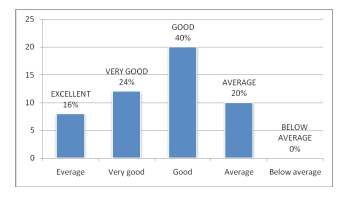
WORKING CULTURE and WORKING ENVIRONMENT OF ORGANIZATION
The second question asked from the employee is what kind of co-operation you are getting from your co-workers and superior about 38% rated well and 6% rated excellent and another 8% says that it is average which shows that there is positive co-operation from co-workers and superior
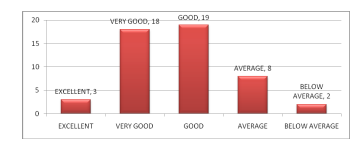
CO-OPERATION YOU ARE GETTING FROM YOUR CO-WORKERS AND SUPERIOR
Organization should provide behavioral training to the employees for the mutual understanding and better team work. There is a need for better learning environment and for the future growth and advancement of employees. The next question which is asked is are you getting an opportunity to enhance your skill the opportunities are good for all the employees in the organization which is clearly visible from the graph about 22% people say that they get an opportunity to enhance their skill it assumes that organization spent their money and time for employees.
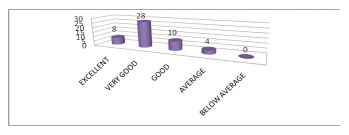
OPPORTUNITY TO ENHANCE SKILLS
The employees reply on the question how do you rate team work and atmosphere of organization 28 % respondents said it is very good.
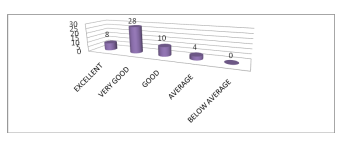
HOW DO YOU RATE TEAM WORK
Organization should provide more challenging task and opportunities for the enhancement and sharpening the skills utilization of employees. For that the organizations have to provide training both in-house and out-house. The question which is asked from the staff is how do rate the quality of training, 24% of employee says it is good and only 10% of employees disagree with statement as shown in this chart.
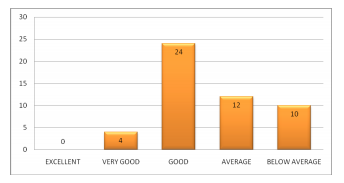
QUALITY OF TRAINING PROVIDED
Employees of the respective organization find that they have future prospects and growth in their own organization the question asked from them is are you satisfied with prospects and career growth 40% say Yes to the statement and only 9% say no.
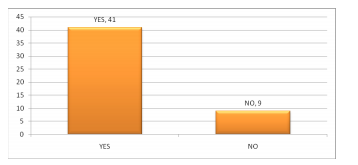
SATISFIED WITH PROSPECTS AND CAREER GROWTH
Organization needs to provide the effective reward and reorganization systems for the motivation ofemployees and to improve their performance. The recognition system been carried out by Organization is very successful and majority of people said they are satisfied with it about 48% say yes to the statement.
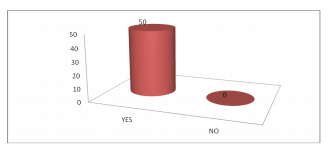
REWARD AND REORGANIZATION
Job Profile is important factor to retain the employee and to improve the performance of organization the question which is asked from the employee is are you satisfied with the Job Profile, all respondents said that they were satisfied with their job profile.
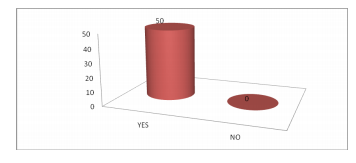
JOB PROFILE
The success of any organization depends upon different impact factors that affect the organization performance and employee. Management can play important role in achieving high-quality service and Product. The study is an attempt to analyze the importance of management practices on job satisfaction of employees. This model identified that employee Training, Performance Appraisal, Team Work and rewards has significant importance to satisfy employee especially in Indian scenario where appraisal and retention policy of any Organization works well.
DISCUSSION
In order to examine the relationship between the Management Practices, employee training and its impact on Organization the management and workers are investigated in several studies in different time and periods. Several studies demonstrated that the Practice of management and training of workers is the key for employee retention and performance. This study attempt to assess that Organization is successful because of the quality of work employees perform. When employees are cared for, and the right environment is created where there are no barriers to performance, their true value to the organization can be fully realized. Lamba and Choudhary (2013) revealed that how HRM practices provide an edge to employee’s commitment towards an organization goal in the global competitive market. The study concluded that HRM practices such as training and development, compensation and welfare activities has significant effect on organizational commitment and are associated with superior organizational performance, which help in retention of knowledgeable and skilled employees. Human resource incentives such as training, employment security, high relative pay, and practices that build trust are likely to induce employee attachment and commitment. Good management practice includes employee views about how they see the business and their involvement in the business. According to (Heskett, J. L. (2002) Labor costs are minimized through low investment in selection, training, participation, and compensation. Information technology is used primarily to automate tasks and electronically monitor performance. However, customer satisfaction and loyalty are likely to suffer because employees have little discretion to meet customer needs. Customization is a good thing: this survey allows modifications to fit each unique organization. Necessary actions to help organizations start performing customer service better. Hussain and Rehman (2013) examined the relationship between the Human resource practices implemented by the organization on employee’s intention to stay and work effectively for the organization. The result of the study explored that HRM practices viz-a-viz: personorganization fit, employment security, communication and training and development are contributing strongly in developing the employees’ intentions to stay with organization. Further, strong positive inter-relationships were found between HRM practices and employees’ retention and such practices enhances employees’ retain ability of organizations. As with the work of Black, S. E., and Lynch, L. M. (2001), have shown that different dimensions of training can have different impacts. While they and others, looked at the distinction between on-the-job and off-the job training, the results here show that the crucial distinction in training types when assessing impacts on productivity growth may be that of general versus specific. As we argued above, employees are not mechanical black-boxes into whom training is injected. Rather they are rational players who must choose the amount of energy they will devote to turning the training they receive into additions to their human capital. Training which increases an individual’s wage with both the existing employer and potential employers provides greater incentives for effort than training which only increases wages with the existing employer. Organization initiated various measures such as investing in new skills, technologies, business models and training program for key technology areas. Growth in the organization extends beyond just numbers and includes personal growth for each individual of the enterprise, growth for customers and growth of our relationships and partnerships.
CONCLUSION
This survey concludes by expressing views about the importance of organization environment. The effectiveness of research depends on its continuous monitoring, evaluation and experience of employee. Monitoring and evaluation must be made available to those who are involved in this process so that they can take the necessary action to improve organization environment. Employee-Employee relationship, Management-Employee relationship, Welfare Policy, Industrial Relation Policies can improve with appropriate Management Practice and appropriate employee education. Experience of employee play very important role because it gives tremendous learning experience with training if we get help from experience/ renowned person in the field, it gives tantamount lift to the employee performance and organization environment.
References:
1. Smith, K. G., Collins, C. J., and Clark, K. D. 2005. Existing knowledge, knowledge creation capability, and the rate of new product introduction in high-technology firms. Academy of Management Journal, 48: 346– 357.
2. Sbaw, J., Delery, J., Jenkins, G., and Gupta, N. 1998. An organization-level analysis of voluntary and involuntary turnover. Academy of Management Journal, 39: 1-15.
3. Wrigbt, P. M., and Sberman, S. 1999. Failing to find fit in strategic human resource management: Theoretical and empirical problems. In P. M. Wright, L. Dyer, J. Boudreau, and G. Milkovich (Eds.) Research in personnel and human resource management (supplement 4): 53-74. Greenwich, GT: JAI Press.
4. Katz, I. F., and Krueger, A. B. 1999. The bigb pressure U.S. labor market of tbe 199O’s. Brooking’s Papers on Economic Activity, 1: 1-65.
5. Long, J. S. 1997. Regression models for categorical and limited dependent variables. Thousand Oaks, GA: Sage.
6. Appelbaum, E., Bailey, T, Berg, P., and Kaileberg, A. 2000. Manufacturing advantage. Ithaca, NY: ILR Press.
7. Batt, R. 1999. Work organization, technology, and performance in customer services and sales. Industrial and Labor Relations Review, 52: 539-564.
8. Gohen, S., and Bailey, D. 1997. What makes teams work: Group effectiveness research from tbe shop floor to tbe executive suite. Journal of Management, 23: 239-290.
9. Lamba, S., and Choudhary, N. (2013). Impact of HRM practices on organizational commitment of employees. International Journal of Advancements in Research and Technology, 2(4), 407- 423.
10. Heskett, J. L. (2002). Beyond customer loyalty. Managing Service Quality: An International Journal, 12(6), 355-357.
11. Hussain, T., and Rehman, S. S. (2013). Do Human Resource Management Practices Inspire Employees’ Retention. Research Journal of Applied Sciences, Engineering and Technology, 6(19), 3625-3633.
12. Black, S. E., and Lynch, L. M. (2001). How to compete: the impact of workplace practices and information technology on productivity. Review of Economics and statistics, 83(3), 434- 445.
13. Gerbart, B., Wright, P. M., McMahan, G. G., and Snell, S. A. 2000. Measurement error in researcb on the buman resources and firm performance relationsbip: Howmuch error is there and bow does it influence effect size estimates? Personnel Psychology, 53: 803-834
14. Houseman, S. 2001. Why employers use flexible staffing arrangements: Evidence from an establishment survey. Industrial and Labor Relations Review, 5:149-170.
15. Batt, R. 2002. Managing customer services: Human resource practices, quit rates, and sales growth. Academy of Management Journal, 45: 587–597.
16. Bowen, D. E., and Ostroff, C. 2004. Understanding HRM firm performance linkages: The role of the “strength” of the HRM system. Academy of Management Review, 29: 203–221.
17. Argote, L., Mc Evily, B., Reagans, R. 2003. Managing knowledge in organizations: An integrative framework and review of emerging themes. Management Science, 49: 571–582.
18. Chatman, J. A., and Flynn, F. J. 2001. The influence of demographic heterogeneity on the emergence and consequences of cooperative norms in work teams. Academy of Management Journal, 44: 956–974.
19. Collins, C. J., and Clark, K. D. 2003. Strategic human resource practices, top management team social networks, and firm performance: The role of human resource practices in creating organizational competitive advantage. Academy of Management Journal, 46: 740–751.
20. Fulmer, I. S., Gerhart, B., and Scott, K. S. 2003. Are the 100 best better? An empirical investigation of the relationship between being a “great place to work” and firm performance. Personnel Psychology, 56: 965– 993.
21. Huber, G. P. 2004. The necessary nature of future firms: Attributes of survivors in a changing world. Thousand Oaks, CA: Sage
|






 This work is licensed under a Creative Commons Attribution-NonCommercial 4.0 International License
This work is licensed under a Creative Commons Attribution-NonCommercial 4.0 International License